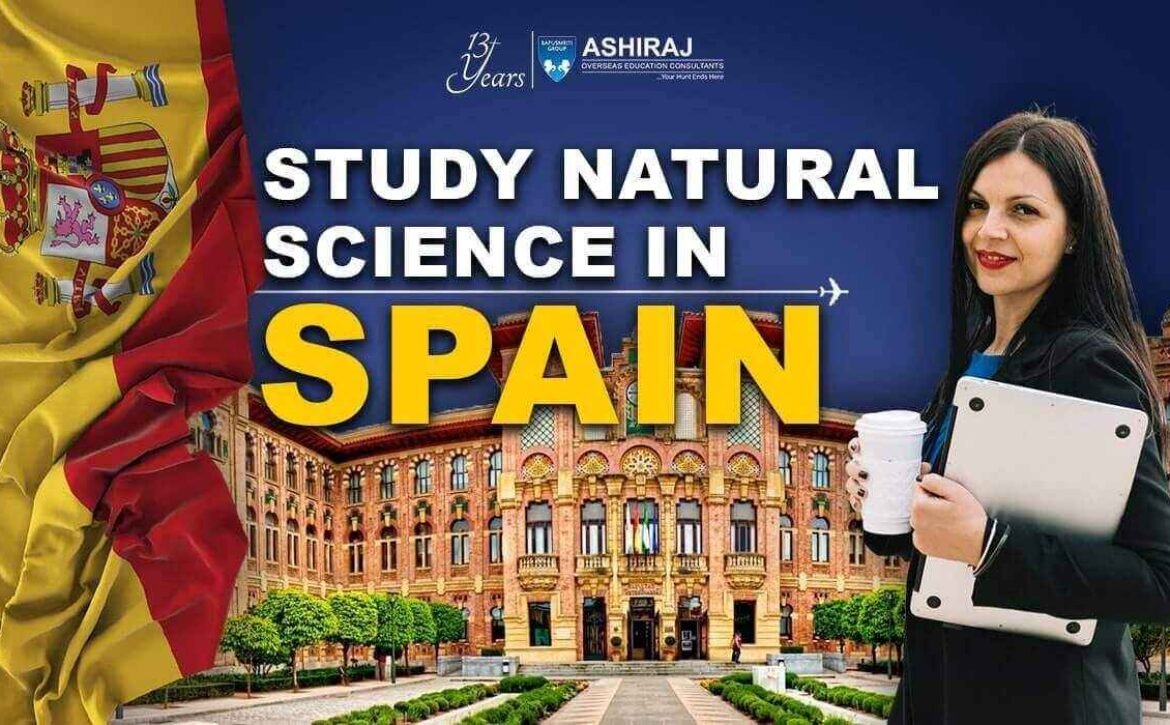
Natural Science in Spain
Natural Science in Spain encompasses a rich tapestry of exploration and discovery, weaving through the nation’s diverse landscapes and historical scientific contributions. From the towering peaks of the Pyrenees to the sun-drenched plains of Andalusia, Spain’s geographical diversity has fueled a broad spectrum of scientific inquiry. The country’s scientific heritage is deeply rooted in the works of luminaries like Ibn al-Baitar, a medieval Andalusian botanist, and the groundbreaking anatomical studies of the Renaissance physician Michael Servetus. Today, Spain continues to be a vibrant hub for natural science, with research institutions and universities pushing the boundaries of knowledge across disciplines such as biology, geology, and environmental science.
In Spain, pursuing Natural Science is not just an academic endeavor; it’s an exploration of the country’s ecological treasures and a commitment to understanding and preserving its natural wonders. The Iberian Peninsula’s unique ecosystems, from the Coto Doñana wetlands to the Mediterranean biodiversity, provide a living laboratory for scientists. The Natural Science in Spain encapsulates this journey of exploration and innovation, inviting scholars and enthusiasts alike to delve into the intricate connections between Spain’s rich natural heritage and the scientific endeavors that seek to unravel its mysteries.
Why Study Natural Science in Spain?
- Breathtaking Biodiversity: Spain’s diverse landscapes, from the Picos de Europa lush forests to the arid beauty of Tabernas Desert, offer a hands-on experience with a wide range of ecosystems.
- Historical Scientific Legacy: Explore the roots of modern science by walking in the footsteps of medieval scholars and Renaissance pioneers. Spain’s scientific history is interwoven with the likes of Ibn al-Baitar and Michael Servetus.
- Cutting-Edge Research Facilities: Spanish universities and research institutions boast state-of-the-art facilities, providing students with opportunities to engage in groundbreaking studies across disciplines like biology, geology, and environmental science.
- Mediterranean Living Laboratory: The Iberian Peninsula’s proximity to the Mediterranean Sea creates a unique environment for scientific exploration. Study marine life, climate patterns, and sustainable practices in a region rich with ecological diversity.
- Cultural Integration: Immerse yourself in Spain’s vibrant culture while studying natural science. Enjoy the fusion of academic rigor with the warmth of Spanish hospitality, creating a holistic learning experience.
- Language Enrichment: Enhance your language skills by studying in a Spanish-speaking environment. Proficiency in Spanish opens doors to a wealth of scientific literature and collaboration opportunities.
In conclusion, studying Natural Science in Spain is a multifaceted journey that combines academic excellence with cultural richness, offering students a unique and enriching educational experience.
Top Universities to Study Natural Science in Spain
Rank | University | QS World University Ranking 2023 | Type of University | Average Annual Fees | Programs Offered |
1 | University of Barcelona | 150 | Public | $1,500 – $4,000 | Biology, Environmental Science, Geology |
2 | Autonomous University of Madrid | 180 | Public | $1,200 – $3,500 | Physics, Ecology, Earth Sciences |
3 | Pompeu Fabra University | 250 | Public | $1,800 – $5,000 | Marine Biology, Biochemistry, Environmental Science |
4 | Complutense University of Madrid | 280 | Public | $1,300 – $3,800 | Geophysics, Botany, Natural Resource Management |
5 | University of Valencia | 320 | Public | $1,500 – $4,200 | Zoology, Conservation Biology, Atmospheric Sciences |
When considering pursuing Natural Science in Spain, the choice of university plays a pivotal role. Here is a curated list of the top 5 universities in Spain for Natural Science based on the QS World University Rankings 2023. The University of Barcelona secures the top spot, offering a range of programs from Biology to Geology. Following closely is the Autonomous University of Madrid, known for its emphasis on Physics, Ecology, and Earth Sciences. Pompeu Fabra University, ranked third, excels in Marine Biology, Biochemistry, and Environmental Science. The Complutense University of Madrid, at fourth place, provides diverse options like Geophysics and Botany. Rounding up the top 5 is the University of Valencia, with programs in Zoology, Conservation Biology, and Atmospheric Sciences. Each institution offers a unique blend of academic excellence and hands-on experience, making them prime choices for those passionate about Natural Science in Spain.
Course Curriculum for Natural Science in Spain
- Foundational Sciences: Begin with core courses in Biology, Chemistry, and Physics, laying a strong foundation for advanced studies.
- Ecology and Biodiversity: Dive into the study of ecosystems, conservation, and the rich biodiversity of the Iberian Peninsula, a key focus in Natural Science in Spain.
- Geological Exploration: Explore the diverse geological formations of Spain, from the Pyrenees to the Canary Islands, understanding the Earth’s history and dynamics.
- Environmental Science: Address pressing global issues through courses in environmental sustainability, climate change, and resource management, tailored to Spain’s ecological challenges.
- Field Studies and Research: Immerse yourself in hands-on experiences with field trips, lab work, and research projects, utilizing Spain’s varied landscapes as a natural laboratory.
- Cultural and Historical Context: Connect scientific knowledge with Spain’s cultural heritage, appreciating the historical contributions of Spanish scientists and their impact on natural science.
- Language Proficiency: Develop language skills, crucial for engaging with Spanish scientific literature and collaborating in a multilingual academic environment.
The Natural Science curriculum in Spain seamlessly blends theoretical knowledge with practical applications, offering a holistic education. By integrating the unique ecological and cultural aspects of Spain, students gain a comprehensive understanding of Natural Science in Spain and its global relevance.
Eligibility Criteria & Admission Requirements for Natural Science in Spain
- Academic Qualifications:
Bachelor’s degree in Natural Science or a related field with a minimum GPA of 3.0 on a 4.0 scale.
Relevant coursework in Biology, Chemistry, and Physics.
- Language Proficiency:
IELTS: Minimum score of 6.5 overall, with a minimum of 6.0 in each section.
TOEFL: Minimum score of 80, with a minimum of 20 in each section.
Emphasizing language proficiency ensures students can fully engage with the curriculum and the Spanish academic environment.
- Standardized Tests:
GRE: A competitive score in the range of 310-320.
GMAT: A competitive score in the range of 650-700.
These scores help assess the candidate’s analytical and quantitative skills, crucial for advanced studies in Natural Science.
- Documentation:
Passport and Student Visa: A valid passport and a student visa for the duration of the program.
Academic Certificates: Submission of academic transcripts and certificates from previous institutions.
Work Experience: While not mandatory, relevant work experience may strengthen the application.
Ensuring that applicants meet these criteria guarantees a diverse and qualified cohort for Natural Science programs in Spain. The emphasis on language proficiency and standardized test scores aligns with the rigorous academic standards of Natural Science in Spain, creating a conducive learning environment.
Documents Required for Studying Natural Science in Spain
- Passport:
A valid passport with a minimum validity of six months beyond the intended period of stay in Spain.
- Letters of Recommendation (LOR):
Two strong letters of recommendation highlighting academic and/or professional achievements.
- Statement of Purpose (SOP):
A well-crafted SOP outlining the applicant’s academic and career goals, and the reasons for choosing Natural Science in Spain.
- Curriculum Vitae (CV):
A comprehensive CV detailing academic and work experiences, publications, and relevant skills.
- Official High School Transcripts:
Transcripts from the applicant’s high school education, demonstrating academic proficiency.
- Educational Certificates:
Certificates from previous academic institutions, attesting to the completion of relevant courses or degrees.
- Work Experience Certificate:
If applicable, a certificate verifying any relevant work experience in the field of Natural Science.
- Proof of Financial Resources:
Evidence of financial capability to cover tuition fees, living expenses, and other associated costs.
Ensuring the submission of these documents is crucial for a smooth application process for Natural Science programs in Spain. These documents provide a comprehensive overview of the applicant’s academic background, skills, and readiness for advanced studies in the field.
Admission Process for Natural Science in Spain
- Research and Choose Universities:
Explore universities offering Natural Science programs in Spain. Consider factors such as faculty expertise, research opportunities, and campus facilities.
- Check Eligibility Criteria:
Review the admission requirements, ensuring you meet the academic and language proficiency criteria. Prepare necessary documents such as transcripts, standardized test scores, and recommendation letters.
- Prepare and Submit Application:
Complete the online application form provided by the chosen universities. Attach all required documents, including a well-crafted SOP, CV, and relevant certificates.
- Language Proficiency Tests:
Take either the IELTS or TOEFL exam to showcase English language proficiency. Include the scores in the application as per the university’s requirements.
- Standardized Tests:
If required, take the GRE or GMAT and submit the scores along with the application. This step assesses analytical and quantitative skills.
- Wait for Admission Decision:
After submitting the application, patiently await the admission decision. Universities typically communicate decisions via email or an online portal.
- Acceptance and Visa Process:
Upon acceptance, follow the university’s instructions for enrollment. Apply for a student visa, ensuring all necessary documents, including proof of financial resources, are submitted.
- Prepare for Departure:
Plan your arrival in Spain, arrange accommodation, and familiarize yourself with the local culture. Prepare for the exciting journey of studying Natural Science in Spain.
Following these steps ensures a smooth and organized admission process for aspiring students entering the field of Natural Science in Spain.
“Education is the most powerful weapon which you can use to change the world.”
Nelson Mandela
Cost of Natural Science Course in Spain
- Tuition Fees:
Public universities in Spain generally offer lower tuition fees compared to private institutions. For Natural Science programs, expect an average annual fee ranging from $1,200 to $5,000, depending on the university.
- Living Expenses:
Living costs in Spain are reasonable, especially in smaller cities. On average, students can budget around $800 to $1,200 per month for accommodation, food, transportation, and other miscellaneous expenses.
- Books and Supplies:
The cost of books and study materials varies but is estimated to be around $500 per year. Some programs may provide online resources or have additional fees for laboratory materials.
- Health Insurance:
Health insurance is mandatory for international students. The cost is approximately $200 to $500 per year, depending on the coverage and the provider.
- Language Courses:
If your program is in Spanish and you need language support, additional language courses may be required. Prices for language courses range from $500 to $1,500, depending on the duration and intensity.
- Miscellaneous Fees:
Budget for miscellaneous fees, including residency permit fees, which can be around $60 to $150, and any specific program-related fees imposed by the university.
Considering these factors, the overall cost of studying Natural Science in Spain is relatively affordable, making it an attractive destination for international students seeking quality education at a reasonable expense.
Scholarships for Natural Science Courses in Spain
Scholarship Name | Eligibility Criteria | Amount | Application Deadline |
Excellence Scholarships | Outstanding academic record in Natural Science or related field | Up to $10,000/year | April 30th |
Research Fellowship | Demonstrated commitment to research in Natural Science | Varies | January 15th |
Merit-Based Scholarships | High GPA and exceptional achievements in prior studies | Up to $5,000/year | March 15th |
Diversity and Inclusion | For underrepresented groups in Natural Science programs | Up to $8,000/year | February 28th |
International Student Aid | Financial need for international students | Varies | Rolling Basis |
Numerous scholarships are available for students pursuing Natural Science in Spain, providing financial support and recognition for academic excellence. The Excellence Scholarships, with an award of up to $10,000 per year, target those with outstanding academic records. Research Fellowships cater to students committed to research in Natural Science, offering variable amounts. Merit-Based Scholarships reward high GPAs and exceptional achievements, granting up to $5,000 annually. The Diversity and Inclusion scholarship supports underrepresented groups in Natural Science programs, providing up to $8,000 per year. For those in financial need, the International Student Aid scholarship offers variable amounts on a rolling basis. Applicants need to check each scholarship’s specific eligibility criteria and adhere to the respective application deadlines to enhance their chances of securing financial assistance for their Natural Science studies in Spain.
Career Opportunities After Natural Science in Spain
Job Profile | Average Salary (EUR) | Overview |
Environmental Scientist | 35,000 – 50,000 | Research environmental issues, ensuring compliance with regulations and promoting sustainability. |
Biomedical Researcher | 40,000 – 60,000 | Engage in cutting-edge research in the medical field, contributing to advancements in healthcare and medicine. |
Geologist | 30,000 – 45,000 | Study the Earth’s structure, composition, and processes, often working in fields like natural resource exploration. |
Data Scientist | 45,000 – 65,000 | Analyze and interpret complex data sets, providing insights for decision-making in various industries. |
Conservation Biologist | 35,000 – 50,000 | Focus on preserving biodiversity, working with ecosystems and endangered species to promote conservation efforts. |
After completing Natural Science studies in Spain, graduates can explore diverse and rewarding career paths. Environmental Scientists play a crucial role in addressing environmental challenges, earning an average salary ranging from 35,000 to 50,000 EUR. Biomedical Researchers contribute to medical advancements, with salaries ranging from 40,000 to 60,000 EUR. Geologists, studying the Earth’s processes, earn between 30,000 and 45,000 EUR. Data Scientists, utilizing analytical skills, earn an average of 45,000 to 65,000 EUR. Conservation Biologists, dedicated to biodiversity preservation, earn salaries ranging from 35,000 to 50,000 EUR. The Natural Science in Spain education equips graduates with the knowledge and skills to excel in these dynamic careers, contributing to both scientific advancements and societal well-being.
Frequently Asked Questions About Natural Science in Spain
Many universities offer Natural Science programs in English, especially at the postgraduate level. It’s advisable to check the language of instruction for each specific program.
Entry requirements usually include a relevant bachelor’s degree, language proficiency (IELTS or TOEFL), and, in some cases, standardized test scores (GRE or GMAT).
Yes, there are various scholarships available based on academic merit, research potential, diversity, and financial need. Check with individual universities for specific scholarship opportunities.
The duration varies. Bachelor’s programs typically take 3-4 years, master’s programs 1-2 years, and doctoral programs 3-4 years.
Yes, international students are allowed to work part-time during their studies. However, there are restrictions on the number of hours, so it’s important to check and adhere to the regulations.
Tuition fees vary but generally range from $1,200 to $5,000 per year for public universities. Living expenses, including accommodation and food, are estimated at $800 to $1,200 per month.
Graduates can pursue careers as environmental scientists, researchers, geologists, data scientists, and conservation biologists, with average salaries varying based on the specific field.
While many programs are offered in English, having basic Spanish language skills can enhance your overall experience and interaction within the local community.
Once accepted into a program, apply for a student visa at the Spanish consulate or embassy in your home country. Provide necessary documents, including proof of acceptance and financial resources.
Yes, many programs incorporate fieldwork and research projects, allowing students to apply theoretical knowledge in practical settings, often utilizing Spain’s diverse ecosystems as a natural laboratory.




